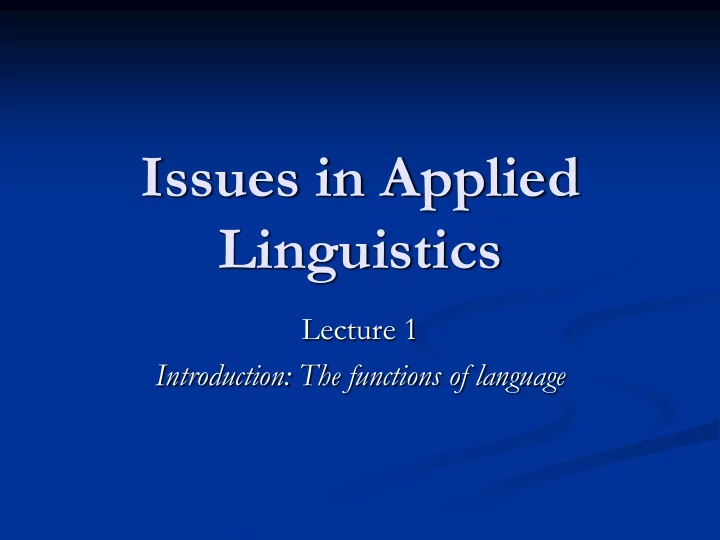

Issues in Applied Linguistics Lecture 1 Introduction: The functions of language
Conceptions of applied linguistics Consumer of linguistic theories Assumes that theoretical linguists have unique access into the reality of language, and applies their findings to language teaching, policy etc. Producer of linguistic theories Examines the practices of speakers in contexts where theoreticians fear to tread, yielding independent insights, concepts and theories.
Areas of applied linguistics examined on this course Language acquisition The nature of communication Interlanguage The native speaker and language teaching Linguistic imperialism New Englishes Critical Discourse Analysis Agency of speakers and learners
Functions of language: producer as agent Communication Representation Performance Expression Play/Escape
Functions of language: recipient as co-agent Interpretation Persuasion Command Inspiration of experience Harm/Soothing/Therapy
Functions of language: inter-action of producer/recipient Being in the social world Bonding Establishing rank Creating and maintaining a reality, a culture Language teaching
A single utterance may be doing any combination of these at once Communication Interpretation Representation Persuasion Performance Command Expression Inspiration of experience Play/Escape Harm/Soothing/Therapy Being in the social world Bonding Establishing rank Creating and maintaining a reality, a culture Language teaching
Case study: extract from a conversation J1: Did you do a lot of shopping when you were in Edinburgh? Clothes shopping? T1: Uh, no. I bought a lot of jeans that are not available in Singapore — J2: Uh-huh. T2: — and a few t-shirts, but not ... jackets, or things like that. Because when the waist fitted, the sleeve lengths were too long — J3: Oh. T3: — and the ... lengths ... didn't fit. J4: 'sit the same when you shop in Australia? Or is it better — T4: Australian clothes are better. J5: Uh-huh. T5: The price is also ... closer to Singapore prices. J6: Yeah, Edinburgh's expensive — T6: Yes ... it is. J7: — UK's expensive. T7: The British pound ... is, I think a little bit more expensive than the Australian dollar.
Interpretation of speaker T across different cultures She is an Australian, around 33. Not really sociable. She only answered what has been asked straight away, but she seemed friendly or willing to do what is required. In conclusion I think she is also good in term of hardworking, friendship, reliable, etc. [Cambodian M, 30] She is Chinese, around 20, upper intermed-iate education, a nurse or a student or a primary teacher, thin, short, attractive. [Myanmar F, 35]
More interpretations of T She is Asian, a non-native speaker, age 30-40, a teacher. She talked causauly and shared the conversation. She indeed seemed to be friendly person. Her speaking's not so sweet to the ears so I don't think she cute, or attractive. She's just all right. [Thai M, 29] She is Indian, late 20s/early 30s, has done O-levels (secondary education), is fat and short, a clerk or assistant secretary. Sounds anxious (tone). [Singaporean F, 40]
Deepening the interpretation (and getting warmer)… She is a Singaporean Indian, 40+, at least tertiary education, a teacher. Sounds like a "normal" person. Somewhat tense. She is "slightly" overweight, average height for a Singaporean woman (about 5'4 ” ). She is knowledgable, well-travelled, talks about currency differences like a seasoned traveller, has enough financial resources (travels, focus on clothes). Probably speaks an Indian language as co-L1 (with English) or L2. Thinks in English. [Singaporean Punjabi M, 43]
Almost to a "T" She is a Singaporean Indian, about 45, a graduate, a teacher or lecturer. She is nice, pleasant, though not exactly relaxed. She has a big build, fat, tall, average looking, wears spectacles, dark. Down-to-earth, good income earner which explains her travelling and shopping often. Confident of herself. [Singaporean Chinese F, 28]
What does this tell us about culture and identity ? The interpretations of T by other SE Asians suggested that the closer one gets culturally to the person being interpreted, the more subtle and accurate are the interpretations made. But inaccuracy does not undo the functional power of our (over)inter-pretations of linguistic identity.
Recommend
More recommend